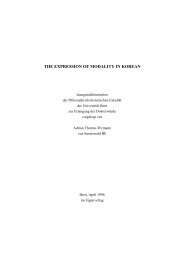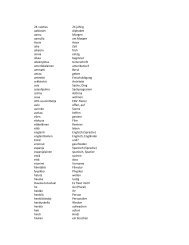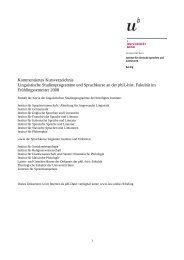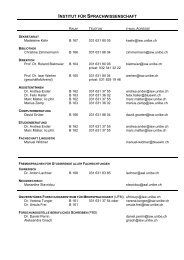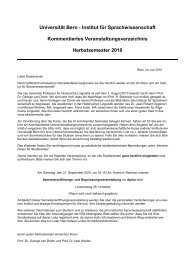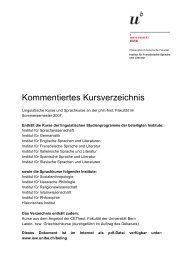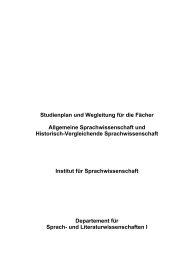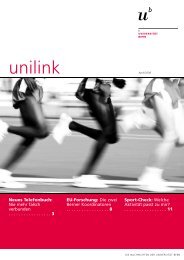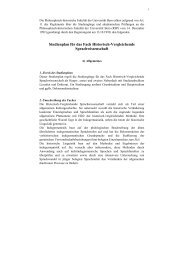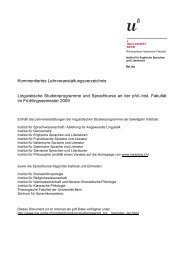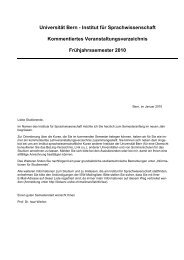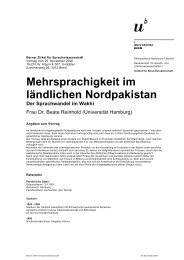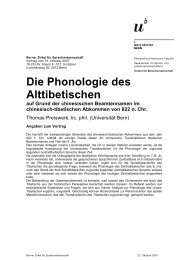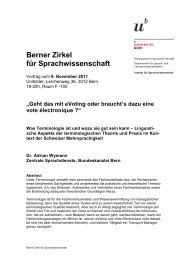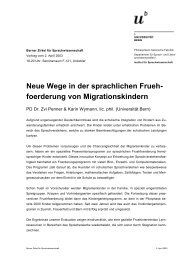BeLing HS 07 - Institut für Sprachwissenschaft - Universität Bern
BeLing HS 07 - Institut für Sprachwissenschaft - Universität Bern
BeLing HS 07 - Institut für Sprachwissenschaft - Universität Bern
Erfolgreiche ePaper selbst erstellen
Machen Sie aus Ihren PDF Publikationen ein blätterbares Flipbook mit unserer einzigartigen Google optimierten e-Paper Software.
Level:<br />
BA/MA: MA students in their first year<br />
Liz: Students in their main studies<br />
Credit Points: BA/MA: 6/Liz.: 7<br />
Open to students as Wahlbereich? Yes<br />
No<br />
Content: Socio-cognitive linguistics refers to an approach to the study of language which takes all human<br />
language to be socially embedded and stored as a facet of cognition (knowledge) in our minds. It rejects the<br />
Chomskyan notion of an autonomous linguistic component of the mind and wishes to see an individual's linguistic<br />
knowledge as that area of knowledge which has to do with language. This automatically means that all other<br />
semiotic systems in the mind interact with language, and including social systems. The individual is seen as a<br />
social being entirely dependent on others for the development of her/his language abilities. Since we are all born<br />
into a 'languaged' world there is no way of avoiding language acquisition (barring serious physical disabilities, of<br />
course), so that we are confronted with a human phenomenon that has a social history within a cultured world.<br />
Language is acquired in every instance of interaction, i.e. through discourse and discursive practices, in which we<br />
are involved. It is thus social and emergent. The accent in socio-cognitive linguistics is on the ongoing social<br />
interaction (or social practice) and the ways in which individuals piece together the "history" of "their" culture,<br />
"their" social group and "their" language. It is, in other words, a very different way of looking at language which<br />
involves cultural notions of performativity, myth and historicisation as well as social notions like power. We shall<br />
be focusing on Cognitive Linguistics by Cruse and Croft (Cambridge University Press) but I shall put together a<br />
compendious reading pack of other materials to be read.<br />
Texts: Alan Cruse and William Croft. 2005. Cognitive Linguistics. Cambridge: Cambridge University Press.<br />
Furthermore, a reading pack will be put together over the summer break.<br />
Aims: To familiarise students with a radical new way of looking at human language.<br />
Credit: Regular attendance and active participation. For MA students evaluation of a written paper of<br />
approximately 6,000 words.<br />
Evaluation (Leistungskontrolle):<br />
Test/Exam<br />
Oral Presentation<br />
Evaluation at end of entire Module only<br />
Date of Evaluation:<br />
Throughout semester<br />
During semester break<br />
Other:<br />
Written Assignment(s)<br />
Other Class Work<br />
Other:<br />
Last week of semester<br />
To be advised<br />
MA Course Module:<br />
M8<br />
LIZ:<br />
Seminar<br />
Title:<br />
Research Colloquium<br />
Instructor(s):<br />
R. J. Watts<br />
Time(s): Tuesday 10-12<br />
First Session(s): 25.9.<strong>07</strong><br />
Level:<br />
BA/MA: MA students in their final year<br />
Liz: Students in their final year, PhD students<br />
Credit Points: BA/MA: 6/Liz.: 7<br />
Open to students as Wahlbereich? Yes<br />
No<br />
Content: This module on the MA programme is intended for MA students who are planning on writing their<br />
Masters theses, but I would also like to see those students attend who are planning, or may already have begun<br />
writing their Liz. theses. The idea behind the course (which will be dealt with as a seminar) is to give students an<br />
opportunity to report regularly on the research they have undertaken and to discuss the issues in that research at<br />
the peer group level. Students are also encouraged to offer what they have written for peer review, since it is only<br />
in this way that theses can be improved, wrong research paths can be avoided and the quality of the final theses<br />
enhanced. I will also introduce important recent work (in the form of articles that have appeared in peer-reviewed<br />
journals) in the areas being researched and will expect all students to study those texts carefully and to offer their<br />
critical opinions on what they have read. The byeword here is "interaction", which means a willingness to<br />
participate actively, critically and usefully in creating a sense of research community.<br />
29



